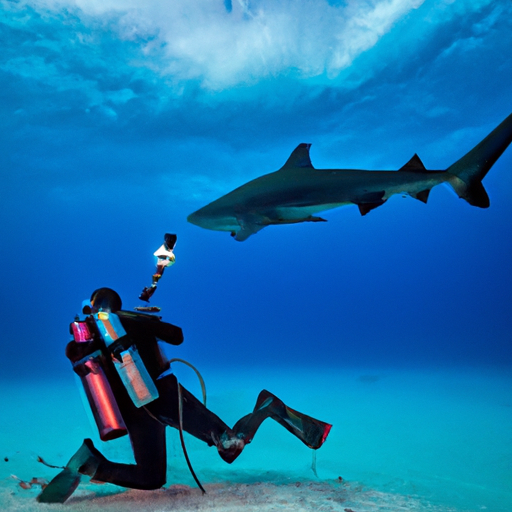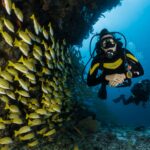Imagine diving into the depths of the ocean, surrounded by the fearsome and majestic creatures of the deep. Now, picture yourself as a professional shark diver, braving the unknown and exploring the mysterious world beneath the waves. But what exactly do professional shark divers do? In this article, we’ll give you an intriguing glimpse into the thrilling life of those who dedicate themselves to studying, protecting, and yes, even swimming with these magnificent predators. So, grab your wetsuit and prepare to be amazed as we take you on an underwater adventure like no other.

Skills and Qualifications
PADI Certification
As a professional shark diver, one of the first skills and qualifications you should possess is a PADI (Professional Association of Diving Instructors) certification. This certification demonstrates that you have completed the necessary training and have the knowledge and skills to safely dive in various underwater environments. The PADI certification is internationally recognized and is a requirement for most diving jobs.
Physical Fitness
Being physically fit is imperative for a professional shark diver. This line of work can be physically demanding, requiring you to swim against currents and carry heavy equipment. Maintaining good cardiovascular endurance, strength, and flexibility will ensure that you can handle the physical challenges and perform your job effectively.
Attention to Detail
Attention to detail is crucial for a professional shark diver to ensure the safety of both themselves and the divers they guide. Paying close attention to equipment checks, dive plans, and environmental conditions is essential to mitigate any risks or hazards that may arise during the dive. Being detail-oriented will also enable you to spot and identify different marine species accurately.
Communication Skills
Strong communication skills are vital for a professional shark diver. You will need to effectively communicate with both your dive buddies and divers you guide, providing necessary instructions, briefings, and safety protocols. Clear communication is crucial underwater to avoid misunderstandings and ensure everyone’s safety and enjoyment.
Knowledge of Marine Life
Having a comprehensive understanding of marine life is an essential skill for a professional shark diver. Identifying different shark species, their behavior, and habitats will not only enhance your overall diving experience but also enable you to educate and inform divers about the marine environment they are exploring. This knowledge will also contribute to shark conservation efforts and provide valuable data for research.
Risk Assessment
Being able to assess and manage risks is a crucial skill for a professional shark diver. You must evaluate environmental conditions, such as currents and visibility, as well as assess the behavior of the sharks you encounter. This skill allows you to make informed decisions about dive plans, potential hazards, and necessary safety measures to ensure a safe and enjoyable dive for everyone involved.
Training and Education
PADI Open Water Course
The PADI Open Water Course is the first step in becoming a certified diver. This course provides the foundational knowledge and skills necessary to safely dive in open water environments. You will learn about dive theory, equipment usage and maintenance, as well as basic underwater skills such as buoyancy control and navigation.
PADI Advanced Open Water Course
Building upon the skills learned in the Open Water Course, the PADI Advanced Open Water Course expands your diving knowledge and abilities. You will complete five specialty dives that introduce you to different aspects of diving, such as deep diving, underwater navigation, and night diving. This course provides more experience and confidence in different diving scenarios.
PADI Rescue Diver Course
The PADI Rescue Diver Course is a comprehensive program that focuses on developing the skills and knowledge needed to prevent and manage diving emergencies. This course enhances your ability to handle different situations, including self-rescue, assisting tired or distressed divers, and managing emergency scenarios. Rescue divers are often the first line of response in diving incidents.
PADI Divemaster Course
The PADI Divemaster Course is the first professional level in the PADI system. It is a leadership program that prepares you to supervise and assist with dive activities, including guiding certified divers and conducting various PADI programs. During the course, you will gain in-depth knowledge of dive theory, hone your diving skills, and refine your leadership abilities.
Specialized Shark Diving Training
In addition to the PADI courses, specialized shark diving training is highly recommended for professional shark divers. This training focuses specifically on diving with sharks, teaching you how to approach, observe, and interact with these magnificent creatures safely. It also emphasizes the importance of shark conservation and educates divers on the ethical considerations of shark diving.
Types of Shark Diving
Cage Diving
Cage diving is a popular form of shark diving where divers are enclosed in a protective cage while sharks are attracted to the area with bait. This allows divers to observe sharks up close in their natural habitat while still maintaining a level of safety. Cage diving is a thrilling experience that offers an opportunity to witness the power and beauty of sharks in a controlled environment.
Open Water Diving
Open water diving involves diving freely in the open ocean, where sharks may be encountered naturally. This type of diving requires a higher level of experience and confidence as divers have less control over the environment and the behavior of the sharks. Open water diving offers a more immersive and authentic experience, allowing divers to observe sharks in their natural state.
Shark Feeding Dives
Shark feeding dives involve attracting sharks to a specific location by providing them with bait or food. This type of diving allows for close-up interactions with sharks during feeding sessions. It is important to note that shark feeding dives can have ethical implications and should be approached with caution to ensure the well-being of both sharks and divers.
Shark Conservation Dives
Shark conservation dives are focused on gathering scientific data, carrying out research, and promoting the conservation of shark species. These dives often involve identifying and documenting different shark species, monitoring their population and behavior, and collecting data that can contribute to conservation efforts. Shark conservation dives play a crucial role in raising awareness about the importance of protecting sharks and their ecosystems.
Preparing for a Dive
Researching the Dive Location
Before embarking on a shark diving expedition, it is essential to research the dive location thoroughly. This includes understanding the local marine life, the behavior of the sharks present in the area, and any specific regulations or restrictions imposed by local authorities. Researching the dive location allows you to plan and prepare accordingly, ensuring a safe and successful dive.
Checking Equipment
Prior to every dive, it is paramount to check and maintain your diving equipment. This includes inspecting your mask, fins, regulator, buoyancy control device (BCD), and tanks for any damage or malfunctions. Regular equipment maintenance ensures that everything is in working order and reduces the risk of equipment failure during the dive.
Assessing Weather and Water Conditions
The weather and water conditions play a significant role in the safety and success of a shark dive. Strong currents, rough seas, or poor visibility can increase the risks associated with diving. Before heading out, it is crucial to assess the weather forecast, tidal patterns, and water conditions to determine if it is safe to proceed with the dive.
Creating a Dive Plan
A dive plan is a crucial part of the preparations for any dive, including shark dives. It outlines the intended dive profile, including maximum depth, bottom time, and decompression requirements, if necessary. Additionally, the dive plan should designate emergency procedures, communication signals, and rendezvous points. Creating a dive plan ensures that all divers involved are on the same page and increases the overall safety of the dive.
Discussing Safety Protocol
Before entering the water, it is essential to have a thorough briefing with the divers involved, discussing the safety protocols and emergency procedures. This includes establishing communication signals, buddy systems, and what to do in the event of an emergency. Open communication and clear understanding of safety protocols are critical to ensure a safe and coordinated dive.

Safety Measures
Using Protective Gear
Using appropriate protective gear is a vital safety measure in shark diving. This includes wearing a wetsuit or drysuit to maintain body temperature, gloves and boots to protect against potential cuts or stings, and a diving mask to enhance underwater vision. Additionally, some shark dives may require specific gear such as shark shields or chainmail suits for added protection.
Following Dive Buddy Systems
The dive buddy system is a fundamental safety practice in diving, where each diver is paired with a buddy who acts as their primary safety support underwater. Buddy systems ensure that divers have someone to rely on in case of emergencies and can provide assistance when needed. It is crucial to establish and maintain good communication and awareness of your buddy’s location throughout the dive.
Maintaining Proper Buoyancy
Maintaining proper buoyancy control is essential for both diver safety and the preservation of the marine environment. Improper buoyancy can lead to accidental contact with sharks and their surroundings, potentially causing harm to both divers and the ecosystem. By mastering buoyancy control techniques, divers can minimize their impact and enhance their overall safety while diving with sharks.
Effective Communication
Clear and effective communication is a critical safety measure in shark diving. Underwater communication devices, such as noise-making devices or underwater slates, can aid in communicating important information or warnings to fellow divers. It is important to establish and practice communication signals with your dive buddies to ensure efficient communication and prevent any potential misunderstandings.
Awareness of Surroundings
Maintaining constant awareness of your surroundings is crucial in shark diving. This includes being mindful of other divers, potential hazards or obstacles in the water, and the behavior of the sharks. By staying vigilant and alert, you can anticipate and respond to any changes in the environment, minimizing the chances of accidents or unsafe situations.
Proper Reaction in Emergency Situations
As a professional shark diver, it is essential to be well-prepared and trained in responding to emergency situations. This includes knowing how to handle a panicked diver, conducting rescues and providing first aid when necessary. By remaining calm and following established emergency protocols, you can ensure the safety and well-being of both yourself and those around you.
Job Responsibilities
Guiding Divers
One of the primary responsibilities of a professional shark diver is guiding divers during shark dives. This involves leading divers to the appropriate dive sites, supervising their activities, and ensuring their safety throughout the dive. It is important to have a thorough knowledge of the dive site, including potential hazards and points of interest, to provide an informative and enjoyable experience for the divers.
Providing Educational Briefings
As a professional shark diver, you have the opportunity to educate divers about sharks and the marine ecosystem. Providing pre-dive briefings that include information on shark behavior, conservation efforts, and safety protocols not only enhances divers’ understanding but also promotes responsible and sustainable shark diving practices.
Ensuring Diver Safety
The safety of divers is of utmost importance for a professional shark diver. This includes conducting thorough equipment checks, assessing dive conditions, and implementing safety protocols during the dive. Continuous monitoring of divers throughout the dive and swift action in case of emergencies is necessary to ensure the well-being and safety of all participants.
Documenting Shark Sightings
As a professional shark diver, documenting shark sightings and behavior is an important part of your role. Recording information such as species, numbers, and behavior patterns contributes to scientific research and conservation efforts. Through accurate documentation, you provide valuable data that helps researchers and organizations better understand and protect shark populations.
Collecting Data for Research
In addition to documenting shark sightings, professional shark divers often collect data for research purposes. This may involve collecting water samples, conducting behavioral observations, or assisting in tagging and tracking programs. By actively participating in research initiatives, you contribute to the knowledge and conservation of sharks and their ecosystems.
Conducting Underwater Tours
Professional shark divers may also be responsible for conducting underwater tours for non-divers who wish to experience sharks up close. These tours provide a unique opportunity for individuals who are not certified divers to witness the beauty and wonder of sharks. Conducting underwater tours requires strong communication skills, a vast knowledge of marine life, and the ability to adapt to different skill levels and comfort zones.

Working Conditions
Varied Dive Locations
Professional shark divers can work in a wide range of dive locations, from tropical reefs to remote areas known for shark populations. This offers the opportunity to experience different underwater ecosystems and encounter various species of sharks. However, it also means that divers must adapt to different environmental conditions and be prepared for the challenges that each unique location presents.
Irregular Working Hours
Working as a professional shark diver often comes with irregular working hours. Dives may be scheduled early in the morning, late at night, or during unconventional times depending on factors such as tides and weather conditions. Flexibility in scheduling and the ability to adapt to changing work hours are necessary to meet the demands of the job.
Exposure to Outdoor Elements
Shark diving involves working outdoors, often in remote or exposed locations. This means being exposed to the sun, wind, and potentially extreme weather conditions. Maintaining proper sun protection, staying hydrated, and dressing appropriately for the weather are crucial to ensure comfort, productivity, and overall well-being while working in these environments.
Limited Visibility
Shark dives can often take place in locations with limited visibility due to factors such as algae blooms or high plankton concentrations. Limited visibility can pose challenges, making it harder to spot sharks or navigate safely. Professional shark divers must possess the skills and experience to adapt to these conditions and ensure the safety and enjoyment of the divers they guide.
Physically Demanding
Shark diving can be physically demanding, requiring divers to swim against currents and carry heavy equipment. Working in these conditions requires a certain level of physical fitness and strength. Regular exercise, strength training, and maintaining overall fitness will help professional shark divers meet the physical demands of their job and perform at their best.
High Level of Focus and Concentration
Maintaining a high level of focus and concentration is essential for professional shark divers. Regardless of the type of dive, remaining focused and alert to potential risks and changes in the environment ensures the safety of divers and promotes a fulfilling experience. Developing mindfulness and mental resilience are key aspects of the job to maintain a calm and attentive state throughout dives.
Career Opportunities
Shark Diving Instructor
Becoming a shark diving instructor allows you to share your knowledge and passion for sharks with others. Teaching aspiring divers how to safely and responsibly dive with sharks provides a rewarding opportunity to inspire and educate future generations of shark enthusiasts. As an instructor, you will guide divers through various training programs and help them develop the skills and confidence needed to dive with sharks.
Marine Biologist
Shark diving can open the door to a career as a marine biologist, specializing in shark species and their ecosystems. By combining your diving skills with scientific knowledge, you can participate in research projects, contribute to conservation efforts, and help uncover the mysteries surrounding these fascinating creatures. A career as a marine biologist gives you the opportunity to make a tangible impact on shark conservation.
Shark Conservationist
As a passionate shark diver, you can become a shark conservationist, dedicating your career to the protection and preservation of shark species. This involves working with organizations and research institutes, conducting fieldwork, and raising awareness about the importance of shark conservation. Through education, advocacy, and community engagement, you can actively contribute to the sustainable management and conservation of shark populations.
Underwater Photographer/Videographer
With the rise of social media and platforms like National Geographic, the demand for captivating underwater photography and videography has increased. As a professional shark diver, you can pursue a career as an underwater photographer/videographer, capturing stunning images and footage of sharks in their natural habitat. This career allows you to share the beauty of sharks with the world while promoting their conservation.
Research Assistant
Professional shark divers can also work as research assistants, supporting ongoing research projects focused on shark biology, behavior, and conservation. This role involves assisting with data collection, analysis, and logistical organization. By actively participating in scientific research, you contribute to the advancement of knowledge and understanding of sharks, highlighting the need for their protection.

Challenges and Risks
Encountering Aggressive Shark Behavior
While relatively rare, encounters with aggressive shark behavior can occur when diving with sharks. Understanding shark behavior and learning to read their body language is crucial in identifying potential signs of aggression and responding appropriately. By adhering to safety protocols and maintaining situational awareness, professional shark divers can minimize the risks associated with aggressive shark behavior.
Injury from Equipment Malfunction
Equipment malfunctions can happen even with regular maintenance and checks. A professional shark diver must be prepared to handle potential equipment failures and respond promptly to mitigate risks. This includes having backup equipment available, practicing emergency procedures regularly, and staying updated on the latest safety guidelines and technology.
Medical Emergencies
In the unlikely event of a medical emergency occurring during a dive, such as decompression sickness or a diving accident, professional shark divers must be trained in first aid and emergency response. Having the ability to assess the situation, provide initial medical treatment, and coordinate with emergency services is critical for ensuring a positive outcome in such situations.
Diving-Related Illnesses
Diving-related illnesses, such as nitrogen narcosis or decompression sickness, can pose risks to professional shark divers. Understanding the signs and symptoms of these illnesses and following proper diving procedures, including decompression stops, can minimize the risks. Additionally, regular health check-ups and adherence to diving safety guidelines are crucial in preventing diving-related illnesses.
Hazards of Deep Diving
Deep diving comes with its own set of challenges and risks. As a professional shark diver, you may have opportunities to dive to greater depths to encounter specific shark species. However, deeper dives require more extensive training, experience, and specialized equipment. Proper decompression procedures and thorough knowledge of deep diving safety protocols are paramount to mitigate the risks associated with deep diving.
Exposure to Dangerous Marine Life
While sharks are often the focus of shark dives, there are other potentially dangerous marine species that divers may encounter. These include venomous marine animals, territorial fish, or marine mammals. Professional shark divers must be knowledgeable about these species and their potential risks, taking appropriate precautions to ensure the safety of divers and themselves.
Ethical Considerations
Negative Impact of Feeding Dives
Feeding dives, where sharks are lured with bait, can have ethical implications. The practice of feeding sharks can disrupt natural feeding patterns, alter behavior, and create dependency on human-provided food. Professional shark divers should be aware of the potential negative impacts of feeding dives and choose operators and practices that prioritize the well-being of sharks and the marine ecosystem.
Respecting Sharks’ Natural Behavior
Respecting the natural behavior of sharks is paramount in ethical shark diving. This includes not encroaching upon their personal space, not touching or harassing them, and not engaging in any behavior that may disrupt their normal activities. Professional shark divers must set an example by adhering to the highest ethical standards and promoting responsible interactions with sharks.
Promoting Conservation and Education
Professional shark divers have a significant role in promoting shark conservation and education. By sharing knowledge, raising awareness about the importance of protecting sharks, and supporting conservation initiatives, divers can contribute to changing perceptions and ensuring a sustainable future for these incredible creatures. Education and conservation efforts are essential to preserving the world’s shark populations.
Minimizing Disturbance to Marine Ecosystems
Professional shark divers should prioritize minimizing disturbance to marine ecosystems during dives. This includes avoiding damage to coral reefs or other fragile habitats, refraining from removing or taking any marine life, and following best practices for responsible diving. By being mindful of their impact and making sustainable choices, professional shark divers can help ensure the long-term health and vitality of marine ecosystems.
In conclusion, being a professional shark diver requires a unique set of skills, qualifications, and knowledge. Through proper training, education, and experience, professional shark divers can safely guide divers, contribute to scientific research and conservation efforts, and promote responsible and ethical shark diving practices. While the job presents challenges and risks, the opportunity to work closely with sharks and the marine environment is incredibly rewarding. Whether pursuing a career as a shark diving instructor, marine biologist, conservationist, underwater photographer/videographer, or research assistant, professional shark divers play a crucial role in understanding, protecting, and celebrating these magnificent creatures.

- Can You Dive With Sharks In California? - August 19, 2024
- What Are The Rules Of Shark Cage Diving? - August 19, 2024
- Where In Florida Can You Dive With Sharks? - August 19, 2024








